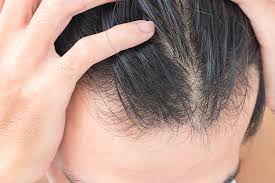 |
| Is This Why Your Hair's Thinning? |
Is This Why Your Hair's Thinning?
THERE is nothing unusual about losing hair -- we all shed an average of 100 hairs a day. Most of these, about 80 per cent, are lost when washing or brushing your hair; the rest will simply drift away throughout the day.
This will not affect your hair's overall appearance because it is only a tiny percentage of the hairs on your head -- as adults, we start out with up to 150,000. And importantly, more hairs are growing than are being shed.
However, millions of Britons suffer from excessive hair loss, or alopecia, where they shed hair faster than it's replaced or stop producing it altogether.
Sometimes hair loss is preventable or reversible. In other cases, it may be permanent. But in most cases, the end result is better when the condition is diagnosed early and treatment starts.
Here, in the first of six superb supple ments on how to beat common health complaints, we've drawn on leading hair experts for the latest advice. We'll explain when you should consult your doctor, as well as what you should and shouldn't do if your hair is thinning, and what food and supplements will help.
The first step is to work out what might be causing the problem.
The growth (or anagen) phase, when a hair is actually growing, lasts from two to three years. Then there is the resting (catagen) phase, when the hairs are no longer growing, but are still attached to the head. This lasts about 100 days and is followed by the shedding (telogen) phase.
At any one time, approximately 90 per cent of the hairs on your head are in the growth phase and between 5 and 9 per cent are 'resting'. The remaining hairs are the ones you are losing.
However, certain factors can cut short the growth cycle and prematurely shift the hair into the shedding phase. This is known as telogen effluvium and seems to be more common in women. POSSIBLE CAUSES: A deficiency in vitamins and minerals, such as vitamin D, vitamin B12 or iron, can lead to this type of hair loss, says Dr Vicky Jolliffe, a consultant dermatologist at the Royal London Hospital and an alopecia specialist. Over-exercise, diets, illness and surgery can all reduce the supply of these nutrients needed for hair growth.
Stress can also cause hair loss. Dr Martin Wade, a consultant dermatologist at the London Skin and Hair Clinic, explains: 'The growth phase can be shifted into the shedding phase by a trigger event.
The 'Three months later, the hair begins to shed. Three months after that, it normally recovers.' Telogen effluvium can also be triggered by problems on the scalp (see box, top right).
Sudden overall thinning may be linked to medical conditions, such as an under-active thyroid -- this slows down the normal turnover of cells, including hair cells. Polycystic ovarian syndrome (PCOS), where cysts form on the ovaries, affect ing a woman's levels of male hormones, can also lead to thin ning hair. And certain drugs, such as anti depressants and roaccu tane, prescribed for acne, can trigger hair loss.
average grows ten hair year WHAT TO DO: Once you've iden tified the cause, the problem can usually be corrected and the hair cycle should normalise within six months to a year, says Dr Jolliffe.
She says while it's tempting to just try a 'hair-boosting' supple ment, see your GP first to rule out anything serious, such as a thyroid problem or PCOS.
However, it's not always possible to find a clear cause and solution. For styling tips and other techniques that may help, see the final page of this guide.
PATCHY HAIR OR TOTAL BALDNESS RANDOM bald spots on the scalp (or body) are known as alopecia areata. This is an auto-immune problem where the immune system attacks the hair follicle, causing inflammation and stop ping the hair growth cycle. …
This will not affect your hair's overall appearance because it is only a tiny percentage of the hairs on your head -- as adults, we start out with up to 150,000. And importantly, more hairs are growing than are being shed.
However, millions of Britons suffer from excessive hair loss, or alopecia, where they shed hair faster than it's replaced or stop producing it altogether.
Sometimes hair loss is preventable or reversible. In other cases, it may be permanent. But in most cases, the end result is better when the condition is diagnosed early and treatment starts.
Here, in the first of six superb supple ments on how to beat common health complaints, we've drawn on leading hair experts for the latest advice. We'll explain when you should consult your doctor, as well as what you should and shouldn't do if your hair is thinning, and what food and supplements will help.
The first step is to work out what might be causing the problem.
HAIR THINNER ALL OVER THE HEAD
IF YOU'RE shedding more hair than usual, there could be a problem with the hair cycle. Each hair follicle, the part of the skin that produces the hair, goes through a cycle with three phases.The growth (or anagen) phase, when a hair is actually growing, lasts from two to three years. Then there is the resting (catagen) phase, when the hairs are no longer growing, but are still attached to the head. This lasts about 100 days and is followed by the shedding (telogen) phase.
At any one time, approximately 90 per cent of the hairs on your head are in the growth phase and between 5 and 9 per cent are 'resting'. The remaining hairs are the ones you are losing.
However, certain factors can cut short the growth cycle and prematurely shift the hair into the shedding phase. This is known as telogen effluvium and seems to be more common in women. POSSIBLE CAUSES: A deficiency in vitamins and minerals, such as vitamin D, vitamin B12 or iron, can lead to this type of hair loss, says Dr Vicky Jolliffe, a consultant dermatologist at the Royal London Hospital and an alopecia specialist. Over-exercise, diets, illness and surgery can all reduce the supply of these nutrients needed for hair growth.
Stress can also cause hair loss. Dr Martin Wade, a consultant dermatologist at the London Skin and Hair Clinic, explains: 'The growth phase can be shifted into the shedding phase by a trigger event.
The 'Three months later, the hair begins to shed. Three months after that, it normally recovers.' Telogen effluvium can also be triggered by problems on the scalp (see box, top right).
Sudden overall thinning may be linked to medical conditions, such as an under-active thyroid -- this slows down the normal turnover of cells, including hair cells. Polycystic ovarian syndrome (PCOS), where cysts form on the ovaries, affect ing a woman's levels of male hormones, can also lead to thin ning hair. And certain drugs, such as anti depressants and roaccu tane, prescribed for acne, can trigger hair loss.
average grows ten hair year WHAT TO DO: Once you've iden tified the cause, the problem can usually be corrected and the hair cycle should normalise within six months to a year, says Dr Jolliffe.
She says while it's tempting to just try a 'hair-boosting' supple ment, see your GP first to rule out anything serious, such as a thyroid problem or PCOS.
However, it's not always possible to find a clear cause and solution. For styling tips and other techniques that may help, see the final page of this guide.
PATCHY HAIR OR TOTAL BALDNESS RANDOM bald spots on the scalp (or body) are known as alopecia areata. This is an auto-immune problem where the immune system attacks the hair follicle, causing inflammation and stop ping the hair growth cycle. …

Comments: 0